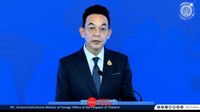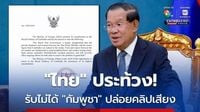On June 18, 2025, at the Government House in Bangkok, Mr. Nikorn Dechpalangkul, Director-General of the Department of Information and Spokesperson for the Thai-Cambodian Border Affairs Center (SBTK), addressed the escalating tensions between Thailand and Cambodia. The meeting, chaired by General Natthapol Nakpanich, Deputy Prime Minister and Director of SBTK, reaffirmed Thailand's position on border security and diplomatic protocols amid recent controversies.
Mr. Nikorn emphasized that Thailand has never closed its border checkpoints but implemented control measures to regulate entry and exit times to safeguard the security of border residents. This approach responds to the ongoing situation along the Thai-Cambodian border, with adjustments made as necessary to maintain stability and safety.
However, on June 17, Cambodia unilaterally banned the importation of Thai vegetables and fruits, a move that has disrupted local farmers and traders. In response, the Thai Ministry of Commerce coordinated efforts to redistribute approximately 2,500 tons of agricultural products domestically, partnering with private sector groups such as CP Group and Central Group. Food festivals and other events are planned to further support Thai farmers affected by this embargo.
Addressing allegations circulating in media and social platforms about Thai activities along the border, Mr. Nikorn firmly denied any violation of the 2000 Memorandum of Understanding (MoU) regarding the Preah Vihear temple area. He clarified that Thai operations, including excavation in sovereign Thai territory, are in accordance with the MoU and international law. The recent Joint Border Committee (JBC) meeting yielded positive outcomes, with both sides agreeing on survey details and boundary demarcation, and Thailand is set to host a special JBC meeting in September.
Regarding the Regional Border Committee (RBC) meeting, both Thailand and Cambodia are negotiating a suitable date, dispelling rumors of Cambodian refusal to participate. Mr. Nikorn urged media and the public to avoid spreading unverified information that could inflame tensions, advocating for balanced, peaceful communication.
Meanwhile, Pol. Lt. Gen. Surasant Kongsri, Deputy Spokesperson of the Royal Thai Army and SBTK, reaffirmed the Thai military's adherence to international principles and the 2000 MoU. Military operations focusing on area development and security enhancement occur solely within Thai sovereign territory. Border checkpoints continue to operate under Thai regulations, accommodating humanitarian considerations for students, patients, and essential personnel.
Amid these border tensions, the Cambodian government organized a “Love the Nation” rally, which coincided with the ongoing disputes. Mr. Nikorn described these events as routine symbolic activities, cautioning against their politicization. The Thai Ambassador in Phnom Penh maintains close contact with Thai nationals in Cambodia, and there is no current cause for alarm.
However, diplomatic relations between the two countries took a severe hit with the leak of a private phone conversation between Thai Prime Minister Paetongtarn Shinawatra and Samdech Hun Sen, President of the Cambodian Senate. The conversation, which included sensitive remarks about Thai military leadership, was released by Cambodia on June 18, triggering an intense backlash in Thailand.
On June 19, the Thai Ministry of Foreign Affairs (MFA), represented by Mr. Nikorn Dechpalangkul, vehemently protested the leak as a breach of diplomatic etiquette and a serious violation of trust between neighboring countries. He stated, “This act is unacceptable and severely damages the relationship and ongoing bilateral mechanisms aimed at peaceful resolution.” The MFA formally delivered a protest letter to the Cambodian Ambassador in Thailand, underscoring that the Prime Minister, regardless of identity, deserves respect under international diplomatic norms.
The MFA also highlighted that Cambodia’s use of social media to incite division and rally domestic support undermines the principles of good neighborliness and international trust. Thai authorities emphasized that the issue remains a government-to-government matter, not a dispute between peoples, and that Thai nationals residing in Cambodia are being closely monitored and supported.
Prime Minister Paetongtarn Shinawatra publicly acknowledged the authenticity of the leaked audio during a press conference at the Government House. She explained that the conversation was a private negotiation tactic aimed at de-escalating tensions with Cambodia by softening her approach towards Hun Sen, who expressed dissatisfaction with the Thai military’s regional commander. The Prime Minister expressed regret over the unauthorized recording and release, emphasizing her commitment to peace and urging unity between the government, military, and the Thai people.
The political fallout was swift and profound. The Bhumjaithai Party, a key coalition member, announced its withdrawal from the government on June 18, citing damage to Thailand’s sovereignty and national interests. All party members tendered their resignations, effective June 19. Subsequently, Mr. Pharadorn Prisananantakul, Deputy House Speaker, resigned, calling the incident a breach of political decorum.
Opposition leader Mr. Natthaphong Rueangpanyawut called the audio leak the “final straw” destroying public trust in the Prime Minister and urged her to dissolve parliament to restore democratic legitimacy. He warned against emotional reactions leading to a coup, emphasizing readiness for immediate elections if dissolution occurs.
The Thai Sang Thai Party condemned the Prime Minister’s comments portraying the Thai military as adversaries, accusing her of lacking leadership and political maturity. They demanded her resignation to preserve national dignity. Meanwhile, calls for investigations into the Prime Minister’s conduct were submitted to the Election Commission and the National Anti-Corruption Commission by political activists.
Public demonstrations were organized by student and civil groups demanding the Prime Minister’s resignation. Former politicians and party leaders expressed dismay over the incident, emphasizing the need to uphold national sovereignty, unity, and respect for the military’s role.
Amid the turmoil, several government ministers, including Ms. Nrumol Pinyosinwat of the Kla Thamma Party and Pol. Gen. Thawi Sodsong of the Prachachart Party, urged calm and solidarity. They stressed the importance of supporting frontline military personnel and maintaining national security while ensuring public confidence in government actions.
Senior military and police officials, alongside ministers, attended the Prime Minister’s press conference, signaling unified government and military resolve. The Prime Minister reiterated her regret over the leak, affirmed the government’s commitment to national security, and called for unity among all Thais to face external challenges.
Meanwhile, Ms. Srasnunt Aranyaporn, Chairperson of the Foreign Affairs Committee and Pheu Thai MP, condemned Cambodian leadership’s actions as deliberately provocative, undermining trust and fomenting hatred between the peoples. She urged Cambodian leaders to act responsibly as ASEAN citizens and not hinder regional harmony, praising the Thai government’s consistent focus on sovereignty, security, and peaceful resolution.
The leaked audio crisis has not only strained Thai-Cambodian relations but also ignited a political storm within Thailand, exposing fractures in governance and party alliances. As September’s special JBC meeting approaches and the RBC talks continue, both nations face the challenge of restoring trust and navigating a path toward peaceful coexistence amid rising nationalistic fervor and domestic political upheaval.
Thailand’s government stands at a crossroads, balancing diplomatic engagement, national security, and internal political stability. The coming weeks will test the resilience of bilateral mechanisms and the country’s democratic institutions, as citizens and leaders grapple with the fallout from one of the most sensitive diplomatic incidents in recent memory.


